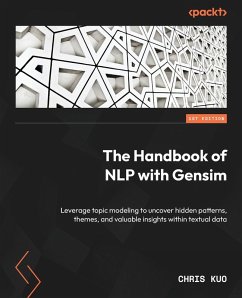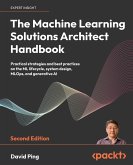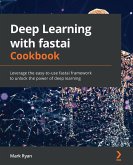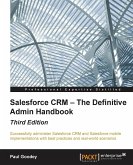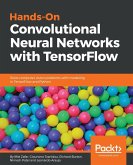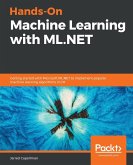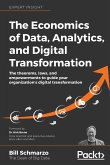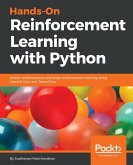Elevate your natural language processing skills with Gensim and become proficient in handling a wide range of NLP tasks and projectsKey FeaturesAdvance your NLP skills with this comprehensive guide covering detailed explanations and code practices Build real-world topical modeling pipelines and fine-tune hyperparameters to deliver optimal results Adhere to the real-world industrial applications of topic modeling in medical, legal, and other fields Purchase of the print or Kindle book includes a free PDF eBook Book Description Navigating the terrain of NLP research and applying it practically can be a formidable task made easy with The Handbook of NLP with Gensim. This book demystifies NLP and equips you with hands-on strategies spanning healthcare, e-commerce, finance, and more to enable you to leverage Gensim in real-world scenarios. You'll begin by exploring motives and techniques for extracting text information like bag-of-words, TF-IDF, and word embeddings. This book will then guide you on topic modeling using methods such as Latent Semantic Analysis (LSA) for dimensionality reduction and discovering latent semantic relationships in text data, Latent Dirichlet Allocation (LDA) for probabilistic topic modeling, and Ensemble LDA to enhance topic modeling stability and accuracy. Next, you'll learn text summarization techniques with Word2Vec and Doc2Vec to build the modeling pipeline and optimize models using hyperparameters. As you get acquainted with practical applications in various industries, this book will inspire you to design innovative projects. Alongside topic modeling, you'll also explore named entity handling and NER tools, modeling procedures, and tools for effective topic modeling applications. By the end of this book, you'll have mastered the techniques essential to create applications with Gensim and integrate NLP into your business processes.What you will learnConvert text into numerical values such as bag-of-word, TF-IDF, and word embedding Use various NLP techniques with Gensim, including Word2Vec, Doc2Vec, LSA, FastText, LDA, and Ensemble LDA Build topical modeling pipelines and visualize the results of topic models Implement text summarization for legal, clinical, or other documents Apply core NLP techniques in healthcare, finance, and e-commerce Create efficient chatbots by harnessing Gensim's NLP capabilities Who this book is for This book is for data scientists and professionals who want to become proficient in topic modeling with Gensim. NLP practitioners can use this book as a code reference, while students or those considering a career transition will find this a valuable resource for advancing in the field of NLP. This book contains real-world applications for biomedical, healthcare, legal, and operations, making it a helpful guide for project managers designing their own topic modeling applications.Table of ContentsIntroduction to NLP Word Embedding Text Wrangling and Preprocessing Latent Semantic Analysis with scikit-learn Cosine Similarity Latent Semantic Indexing with Gensim Using Word2Vec Doc2Vec with Gensim Understanding Discrete Distributions Latent Dirichlet Allocation LDA Modeling LDA Visualization The Ensemble LDA for Model Stability LDA and BERTopic Real-World Use Cases
Hinweis: Dieser Artikel kann nur an eine deutsche Lieferadresse ausgeliefert werden.
Hinweis: Dieser Artikel kann nur an eine deutsche Lieferadresse ausgeliefert werden.

